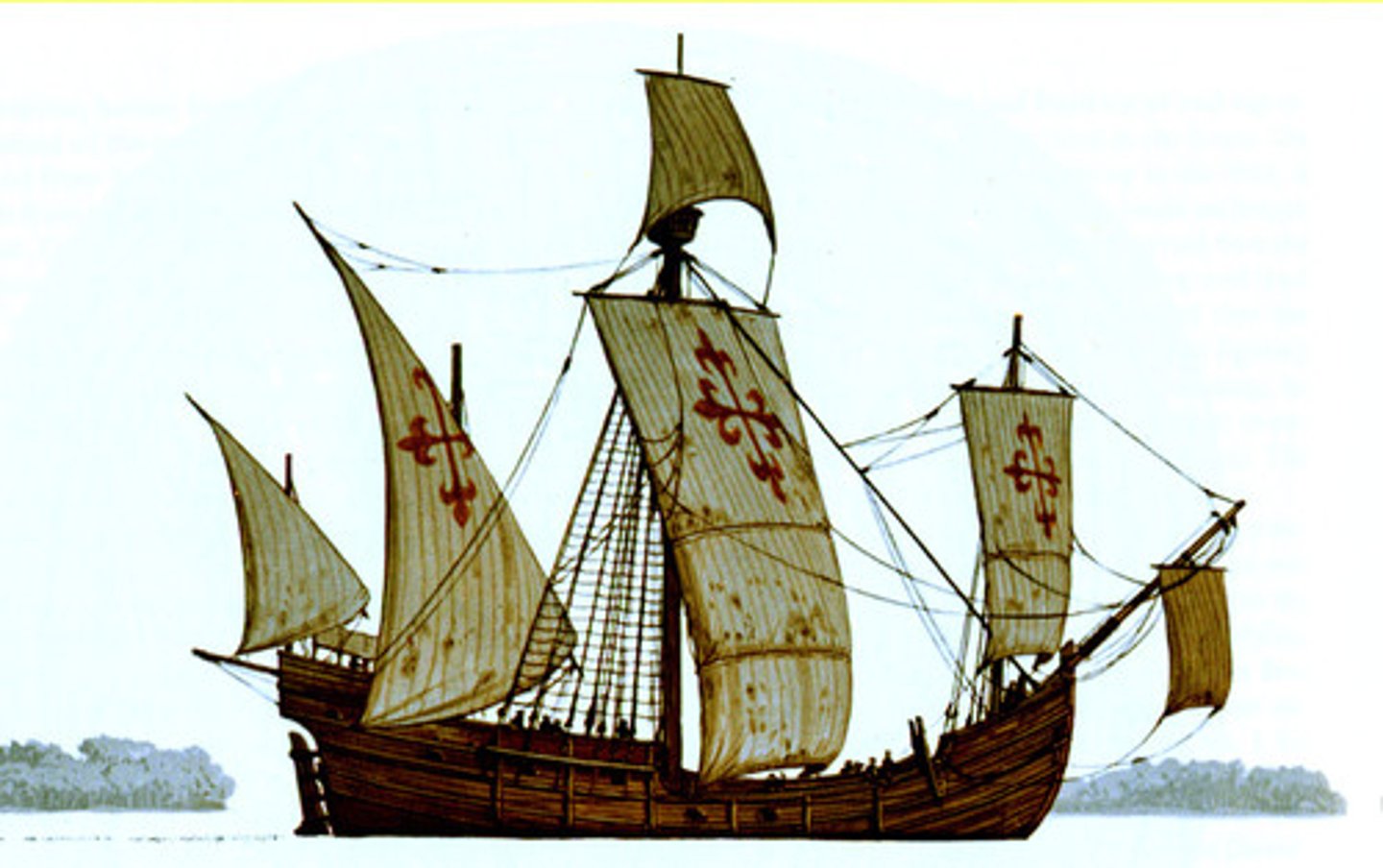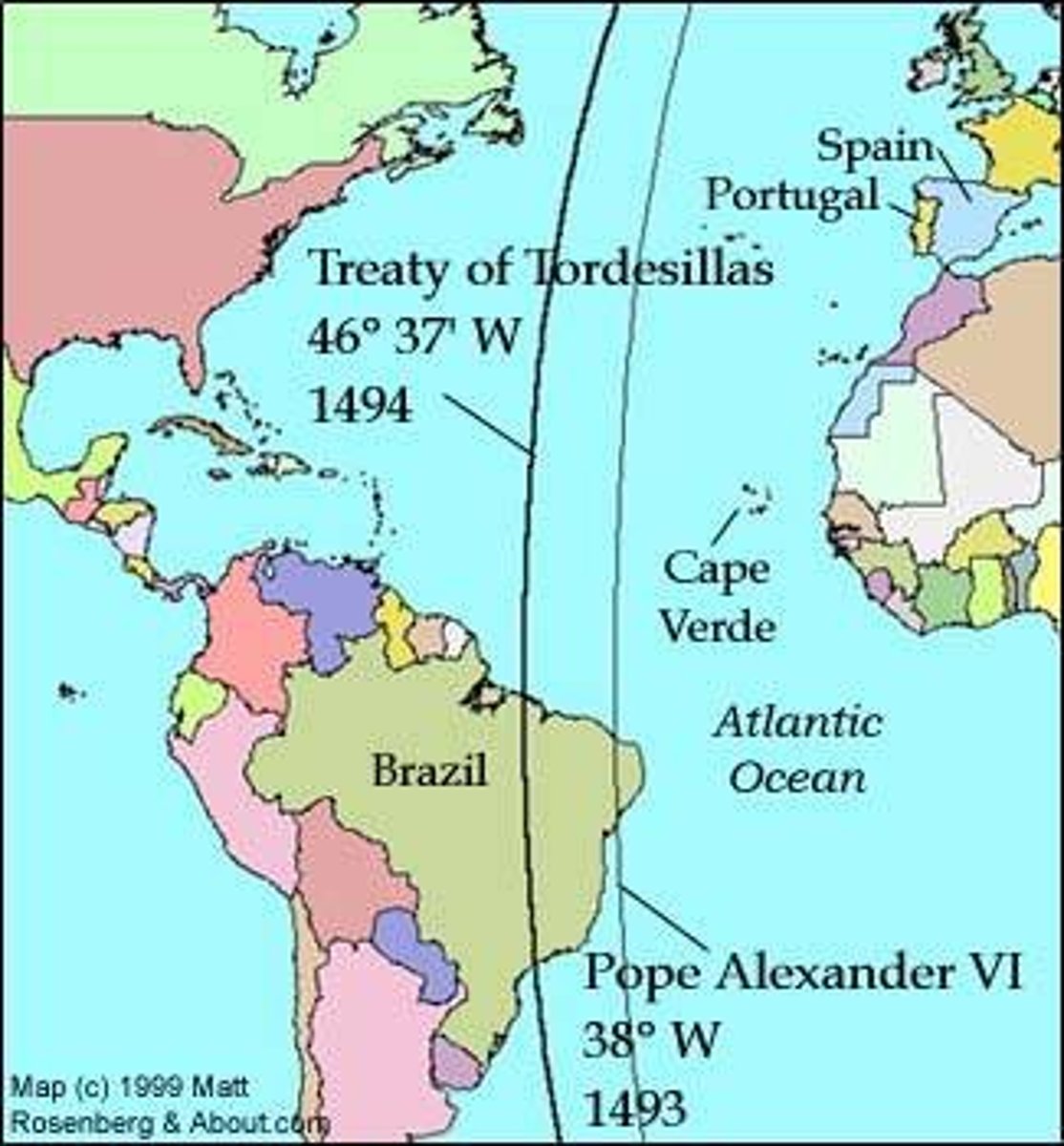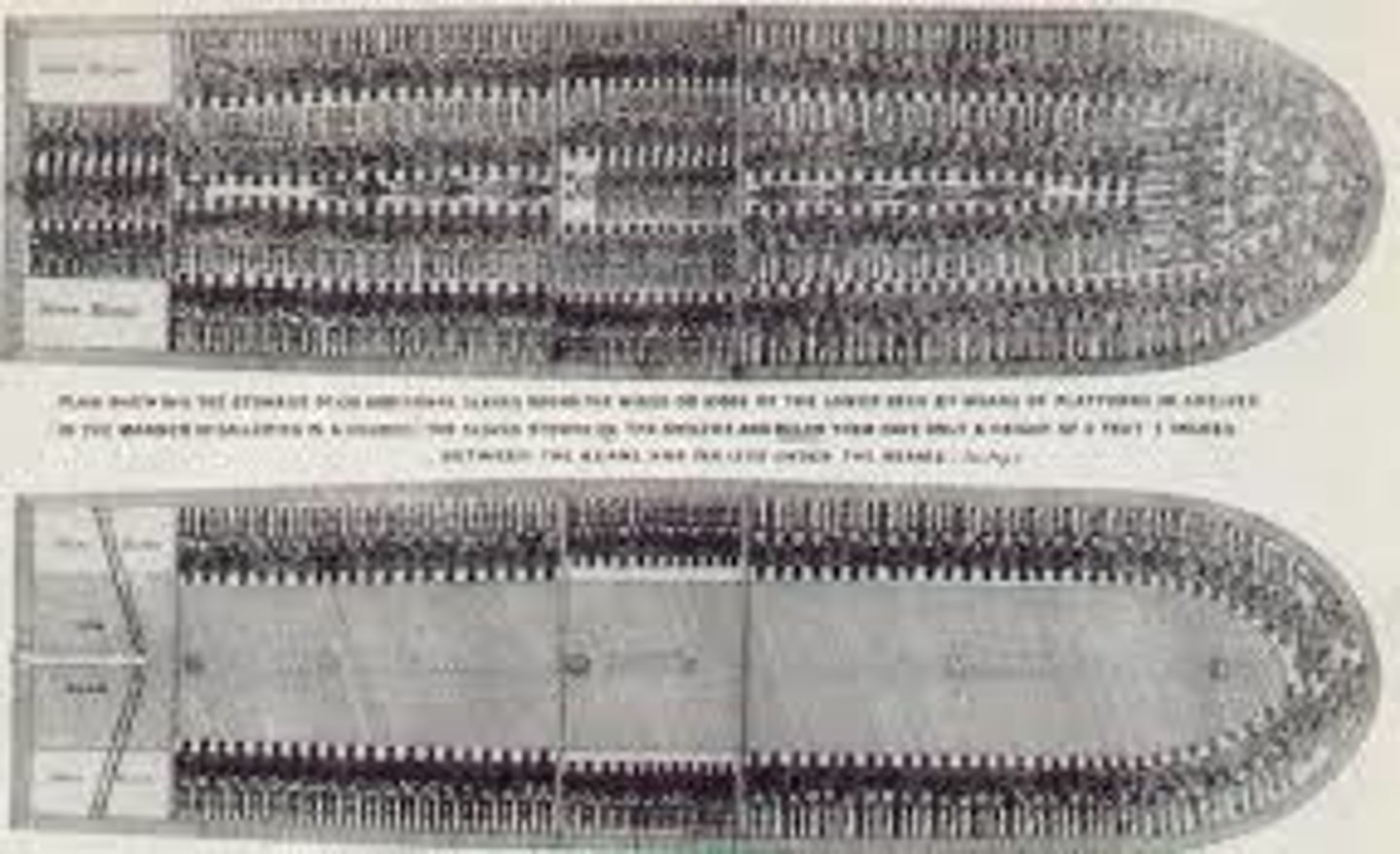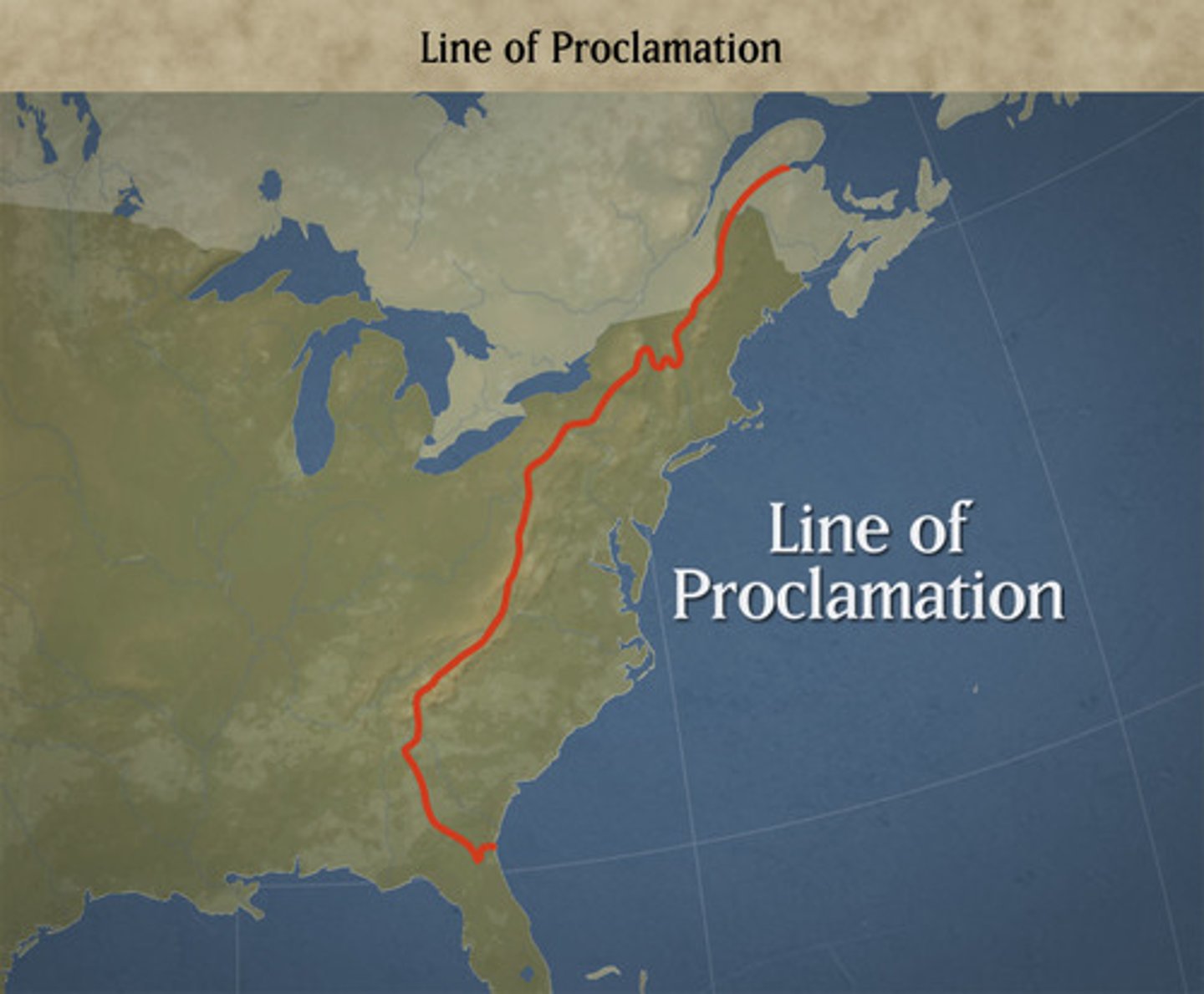APUSH Terms
1/659
There's no tags or description
Looks like no tags are added yet.
Name | Mastery | Learn | Test | Matching | Spaced |
|---|
No study sessions yet.
660 Terms
Aztecs (1.2)
Central America/Mesoamerica, also called Mexica, massive capital city Tenochtitlan, written language, complex systems of irrigation, human sacrifices for fertility, vast quantities of gold and silver plundered by Spanish
Maya (1.2)
Yucatan peninsula, large cities, complex irrigation + water storage, stone temples and palaces for gods-descended rulers
Inca (1.2)
Andes along Pacific coast, absolutely massive, ruled ~16mil people at its height, covered ~360k square miles, cultivation of fertile mountain valleys, grew potatoes and other crops, watered by elaborate irrigation systems, vast quantities of gold and silver plundered by Spanish
Maize (1.2)
Corn-like crop cultivated by Aztecs, Inca, Maya, nutritious, supported economic development, permanent settlements, advanced irrigation, social diversification as it spread North
Pueblo (1.2)
New Mexico/Arizona, sedentary population, farmed maize and other crops, built adobe + masonry homes, highly organized, administrative offices, craft shops, converted to Christianity and brought Christ into their pantheon of gods
Ute (1.2)
Good example of Plains society, lived hunter-gatherer lifestyle in small egalitarian kinship based bands
Chinook (1.2)
Good example of Pacific Northwest society, lived by the sea, settled into fishing villages, relied on elk, used surrounding cedar trees to make giant plank houses
Chumash (1.2)
Also on Pacific coast, further south, hunter-gatherers living in permanent settlements
Hopewell (1.2)
Good example of Mississippi River Valley society, fertile soil around river allowed societies to farm and develop, lived in towns of 4-6k population and traded extensively with other regions
Cahokia (1.2)
Also Mississippi River Valley, largest civilization in that area, ~10-30k population at its height, led by powerful chieftains who centralized government and traded extensively with other far off regions
Iroquois (1.2)
Northeast region, lived in villages of several hundred and grew crops like maize, squash, beans (three-sister farming, three crops grew best when planted near each other), lived in longhouses housing 30-50 family members
Black Plague (1.3)
You know what the Black Plague is. Basically refreshed the European population after killing 1/3 of them, population rebound helped push European exploration
Prince Henry the Navigator (1.3)
Portuguese prince, attempted to find Atlantic trade route to Asia, went around Africa, established trading post empire along African coast,
Caravel (1.3)
Type of ship specialized only for trade, ocean-worthy but easy to maneuver, can sail into the wind, solved the problem of sailing around Africa

Isabella and Ferdinand (1.3)
United Spain under Catholicism, reconquered the Iberian peninsula from the Muslim Moors (Reconquista)
The Crusades (1.3)
Campaign against Muslims to dominate the Holy Lands, partially response to continued Muslim control of parts of Europe, cemented religious intolerance along with Reconquista, dramatically increased maritime trade due to European traders not wanting to go through Muslim middlemen on the Silk Road
God, Gold, and Glory (1.3)
Fun shorthand for the motivations for European colonization!!!1!11 God: spreading Christianity and increasing Christian worldwide influence, Gold: finding new routes to trade Eastern goods, Glory: European competition for global domination
Feudalism (1.3)
System dominating Europe pre-colonization, peasants/serfs lived and worked on the land of a noble in exchange for armed protection from knights, influx of wealth from colonialization hastened end of system
Christopher Columbus (1.4)
Genoese explorer, sought sponsorship from Isabella and Ferdinand to seek trade route to Asia by going West, set sail across the Atlantic in 1492, landed in San Salvador but thought was China
Taíno/Arawak (1.4)
Indigenous peoples that Columbus first encountered, fishing, very generous and accommodating to Columbus's men, wore gold jewelry that Columbus brought back Spain to show off, population decimated by disease and overwork (esp mining for gold)
Columbian Exchange (1.4)
Transfer of food, animals, minerals, diseases, and people between Africa, Europe, and the Americas, fundamentally changed the societies and economies of all three continents, high yield/nutrient foods like tomatoes, potatoes (+tobacco) going to Europe, rice, wheat, soybeans, to Americas, also introduced pigs, cattle, horses
Smallpox (1.4)
Most notable of the European diseases, ravaged Native peoples of North America because had no exposure or immunity to smallpox
Botany (1.4)
Science of plants fueled by the cataloguing of newly discovered American plants, medicinal plants used by enslaved Africans to help with adapting to new surroundings
Treaty of Tordesillas (1.5)
Divided the world into West Hemisphere (Spanish domain) and Eastern Hemisphere (Portuguese domain), negotiations helped by Pope Alexander VI

Encomienda System (1.5)
Men called encomenderos were granted portion of land, all natives living on that land then became enslaved labour force for the farming/mining occurring there, justified on religious grounds because encomenderos would pay tax to the crown and promise to try and convert the indigenous people
Requirimiento (1.5)
Document issued by Ferdinand and Isabelle of Spain, Pope granted Spanish monarchs authority to claim land in Americas + try to convert whoever they found there, priests sent w protection of the crown, Natives who converted got this protection
Mestizo (1.5)
Person of mixed indigenous and Spanish descent (3rd in caste),
Capitalism (1.5)
Replaced feudalism in Europe, system based on private ownership and free/open exchange of goods between property owners
Peninsulares (1.5)
People born and raised in Spain (1st in caste)
Criollos (1.5)
People of Spanish descent born in colonies (2nd in caste)
Mulattoes (1.5)
People of mixed Spanish and African ancestry (4th in caste)
Mission System (1.6)
New Spanish manner of expansion, sending missionaries to convert Natives to Christianity, missionaries found people with fundamentally different world views
Pueblo Revolt (1.6/2.5)
Spanish missionaries tried to put stop to polydeist method of worship, Pueblo people also sustained drought and attack from other Native groups, led by Popé they rose up, killed ~400 Spanish settlers, burned down all the churches, remaining Spanish fled then returned 12 years later, became more tolerant afterward
Bartolome de Las Casas (1.6)
Franciscan priest who had spent many years as a missionary, argued that if Spain continued to kill and brutalize the Natives their souls would be lost to God, also those who did survive would hate Christianity, advocated for use of African labour instead of Native in encomienda system
Wampanoag (1.6)
Attempted to negotiate w English diplomatically, leader Massasoit initially formed alliances with English settlers that were increasingly ignored, son was further pressured into ceding Wampanoag land and sovereignty
Casta System (1.6)
Spanish caste system based on a person's proximity to Spanish heritage, established as a means to tax, the lower your caste the more tax you pay
Samuel de Champlain (2.2)
Established in 1608 first permanent French settlement of Quebec, much more interest in trading less in conquest compared to Spanish or English, fish/fur, allied w Hurons and Algonquians and agreed to fight against Iroquois
Ojibwe (2.2)
Located in what is now Canada, French fostered alliances w them, cultural exchanges occurred, Indians gave French knowledge of preparing beaver pelts for market, French gave Indians iron cookware/farming tools + manufactured cloth
Henry Hudson (2.2)
Dutch (just like French) sought water-based passage through Americas, was sent by Dutch to find that, sailed up Hudson river and claimed New Amsterdam for the Netherlands
New Amsterdam (2.2)
Facilitated Dutch economic goals, became trading hub that attracted other traders/fishermen/farmers, no interest in converting Natives
Enclosure Movement (2.2)
Took common land and sold it to private parties, drove English peasant migration to Americas, set out in family groups to establish new homes (different from French and Dutch trading groups), drove up crime rates and forced people into the cities which meant even less jobs
Calvinism (2.2/4.10)
Major Protestant Reformation movement, took hold in Spanish Netherlands, made them want to become independent from Spain, dominated First Great Awakening and believed salvation already pre-determined
Dutch East/West India Company (2.2)
East India company established to trade in Asia, West India company established to trade in Americas, powerful corporations that led Dutch colonialism
Roanoke (2.2)
First English attempt at colonization, island off coast of North Carolina, struggled to survive, vanished by 1590, called "the lost colony"
Joint Stock Company (2.3)
Precursor to modern day corporation, spread riches/risk of entrepreneurial undertaking, people could buy shares in the company and its more removed from ones personal wealth, helped explorers go out into the new world w many different backers/sponsors
Jamestown (2.3)
1607, financed by the Joint Stock Companies, Chesapeake region, dug for gold/silver then established military forts to protect riches, famine/disease killed most settlers in first years
Tobacco (2.3)
John Rolfe's experimentations with tobacco planting saved Jamestown colony's economy basically, most labour done by indentured servants, made farmers need more land leading them to encroach more on Native land
Indentured Servitude (2.3)
People who couldn't afford passage across Atlantic so signed 7 year labour contract where they worked to pay off their settlement fees, those who paid for indentured servant's passage got 50 acres of land
Bacon's Rebellion (2.3)
Settlers wanted to take land from the Natives and stop them from retaliating for taking the land, governor William Berkley decided cause not worth effort, Nathaniel Bacon led other poor farmers/indentured servants'black slaves in attack against Indians then wrecked Berkley's plantations, led to elite fear of white uprisings and shift toward African enslaved labour
New England Colonies (2.3)
Settled by Pilgrims in 1620, paved way for influx of Puritan settlers, migrated as family groups, family economies as farmers, fevers/disease killed half of original settlers, economy centered on agriculture/commerce
Puritans (2.3)
Protestants unhappy w theology and stricture of Church of England, sought to emigrate so they could live by their own conscience, first settled in religiously tolerant Holland but struggled making living as farmers in urban area so moved to America
British West Indies/Southern Atlantic Coast (2.3)
First permanent colonies in 1620s on Caribbean islands, long growing seasons, tobacco became primary cash crops, sugarcane more profitable by 1630s
Sugarcane (2.3)
Growth/production extremely labour intensive, drove demand for enslaved African labour, majority of population Black, planter elites enacted harsh slave codes
Slave Codes (2.3/2.6)
Strictly regulated behaviour of enslaved people, formally defined them as property (chattel) inspired South Carolinians to try and replicate system on mainland, made slavery a perpetual inherited institution, laws became harsher and harsher as time passed
Middle Colonies (2.3)
NY/NJ developed export economy based on cereal crops bc sea shot thru/had tons of rivers, diverse population that became increasingly unequal w emergence of elite class, urban merchants on top, then artisans/shopkeeps, then unskilled labourers, orphans, unemployed, then enslaved Africans
Pennsylvania (2.3)
Middle Colony started by William Penn, Quaker/pacifist, religious freedom recognized for all, negotiated w Indians to expand land
House of Burgesses (2.3)
Virginia's representative assembly (first in US!), could levy taxes and pass laws
Mayflower Compact (2.3)
Signed and bound to by the pilgrims in New England, government organized on model of self-governing church congregation, concentrated power into participatory town meetings
Triangular Trade (2.4)
Three point journey, example: starting in New England carry rum to West Africa, rum traded for enslaved labourers, sail Middle Passage, arrived in British West Indies and traded for sugar cane, sugar cane then traded for rum
Middle Passage (2.4)
Horrifying middle route between Africa and Americas, enslaved people packed into ships and often died of disease or starvation before reaching American shores
Slave Trade Act (2.4)
Passed by British parliament in 1788, limited number of enslaved people that could be stuffed into the hull of a ship, image was reformed version of the ship layout

Mercantilism (2.4)
Dominant European economic system, assumed fixed amount of wealth in the world bc measured in gold and silver, wanted to maintain favourable balance of trade where exports>imports, establishment of colonies important, encouraged government regulation in economy for purpose of enhancing state power
Navigation Acts (2.4)
Series of British laws passed to control terms of trade btwn Britain and its colonies, required merchants to engage in trade w English colonies exclusively in English ships, certain valuable trade items were required to pass through exclusively British ports
Consumer Revolution (2.4)
Transatlantic trade generation massive wealth for society elites, made trading ports urban centers, affluent families bought more goods, societal status now more tied to financial success/refined lifestyle rather than family pedigree
Metacom's War/King Phillip's War of 1675 (2.5)
Caused by British encroachment on Indian land, Metacom realized British encroachment was destroying their ancestral ways of life so must be forced out, allied w other Indian groups and burned fields, killed men, captured women and children, Mohawk allies to British captured and killed Metacom, marked end of Indian resistance to British colonization on East Coast along w Anglo-Powhatan Wars in Virginia
Syncretism (2.5)
Amalgamations of distinct religious traditions, good example is the Pueblo's adoption of Christianity
Plantation System (2.6)
Practiced in Chesapeake colonies, drove demand for enslaved labour, heavy reliance on enslaved labour
Chattel Slavery (2.6)
Term for race-based slavery, were the property of the people who owned them, British West Indies had most influence on how chattel slavery carried out
Slave Resistance (2.6)
Many enslaved people found ways to resist, covertly and overtly, covert egs secretly practicing cultural customs of homelands or speaking native languages or slowed work by breaking tools/damaging crops, overt very worrisome for white enslavers
Stono Rebellion (2.6)
South Carolina 1739, small grp of enslaved men stole weapons from store, killed white owners of store, as they marched along Stono river more enslaved men joined them, burning plantations and killing white people along the way, squashed and everyone either killed in battle or hanged later
New York Conspiracy Trials of 1741 (2.6)
Racial tensions rising in NYC after Stono Rebellion, thirteen fires broke out in city, white population spread rumours that fire was part of a slave revolt, 17 New Yorkers executed (13 were black)
Enlightenment (2.7)
Movement in Europe emphasized rational thinking over tradition and religious revelation, spread bc robust transatlantic print culture, scientific inquiry, diminished confidence in authority of biblical revelation
John Locke (2.7/3.4)
Popular Enlightenist philosopher/author, Two Treatises on Government awakening colonists to idea of natural rights
Natural Rights (2.7/3.4)
Idea that human beings simply because they exist have rights to liberty and property given to them by a Creator, not a monarch
Social Contract (2.7/3.4)
By Jean-Jacques Rousseau, power to govern was in the hands of the people, willingly given to a government which would in turn vow to protect the peoples' natural rights, if a government failed the people had the right to overthrow it
Great Awakening (2.7)
Massive religious revival led by the New Light Clergy, swept the colonies, generated intense Christian devotion and enthusiasm
New Light Clergy/New Lights (2.7)
Lamented loss of faith in biblical revelation, inspired by German pietism which emphasized heart over head in reference to spiritual matters, emphasized democratic tendencies of the Bible, lack of wealth did not diminish God's favour upon them, those who rejected these ideas called Old Lights
Jonathan Edwards (2.7)
New England minister/scholar, preached sermons combining Enlightenment ideas with intense religious fervor, famous sermon Sinners in the Hands of an Angry God, concerned with joy of God and derivative joy of other human beings, lit fire of Great Awakening
George Whitefield (2.7)
Part of Methodist revival in England, travelled to US, travelled up and down Eastern seaboard, preached in churches, street corners, fields, magnificent preacher and people flocked to him
Anglicanization (2.7)
Shift in colonies to be more politically similar to British
Impressment (2.7)
Practice of seizing men and forcing them to serve in Royal Navy, British thought was reasonable, Americans did not agree, life aboard British naval ships dangerous
King George's War (2.7)
1747, part of the war of Austrian succession, George III ordered general impressment of men from America, Americans rioted for three days in response
Progressivism (2.7)
Belief that through power of observation and reason, humans can make unlimited linear progress over time (Enlightenist ideal)
Freemasons (2.7)
Members of a fraternal society advocating for Enlightenist principles of inquiry and tolerance, originated in London coffeehouses, Benjamin Franklin prominent member who advocated for their ideals
Deism (2.7)
Belief in a God who created the universe but then left the world and the events occurring in it alone, belief that personal morality is more important than church doctrine
French and Indian War (3.2)
British fighting against the French and Indians, smaller conflict in context of Seven Years' War occurring on American soil, British American colonists encroaching on French claims in Ohio River Valley, led to colonists pushing westward for more land, intensified conflicts w Native Americans
Seven Years' War (3.2)
Global conflict between the British and French, led to British expansion of impressment, quartered troops in colonial homes, people threatened with violence if refused, cost a ton (doubled British national debt)
Fort Duquesne (3.2)
British post in Pennsylvania, taken control of by French, Washington led surprise attack w Indian allies in 1754 and regained it, French then regained it 2 months later, cause of French and Indian War
Albany Congress/Convention (3.2)
Meeting to discuss British colonial defense against French and Indians, delegates from several colonies discussing a more organized colonial response to frontier defense, trade, and westward expansion, Iroquois Confederation also invited but didn't participate in discussions
Albany Plan of Union (3.2)
Introduced at Albany Congress by Benjamin Franklin, colonies would establish council of representatives to discuss frontier defense, trade, westward expansion, rejected bc taxations required to exist were unpopular, laid foundations for Revolution
Peace of Paris (3.2)
1763, ended Seven Years' War, Spain ceded Florida to British, French ousted from North America + Spain given control of French lands west of Mississippi, all land east of Mississippi River granted to British (ie Ohio River Valley)
Pontiac/Pontiac's uprising (3.2)
Ottowa leader, led raids against encroaching colonists in Detroit/other military forts in Virginia and Pennsylvania, used to trading with the French, British attitudes and actions provoked distrust in Native groups
Proclamation Line of 1763 (3.2)
Forbade colonists from migrating West across Appalachian mountains and taking land in Ohio River Valley, order ignored basically bc they thought war was fought on their soil at their cost so they were entitled to the spoils

Salutary Neglect (3.3)
British Parliament left many day-to-day decisions of political rule to the colonists, e.g. colonists ignoring Navigation Acts and engaging in smuggling/illegal trading, British never really enforced the laws
George Grenville (3.3)
British prime minister, three pronged plan to regain control over colonies: 1. stricter enforcement of current laws (e.g. Navigation Act) 2. Parliament extending wartime provisions into peacetime 3. Quartering Act of 1765 kept British soldiers stationed in the colonies and made the colonists responsible for their food/housing
Sugar Act (3.3)
Imposed taxes on coffee, wine, other luxury items, and more heavily enforced existing taxes on molasses
Stamp Act of 1765 (3.3)
Tax on all paper items produced in colonies, had to be purchased/paid for using British hard currency (rarer than abundant colonial paper currency)
Currency Act (3.3)
Prohibited colonial assemblies from printing their own paper currency, supply of money in colonies being restricted at the same time as British demanding more taxes
No Taxation Without Representation (3.3)
Inspired by Enlightenist ideas about natural rights, colonists started protesting, British officials argued that they are represented through virtual representation
Virtual Representation (3.3)
Parliament represented not necessarily locations but rather the interests of all British classes, Americans argued that the only people who could truly represent their interests were those from the colonies